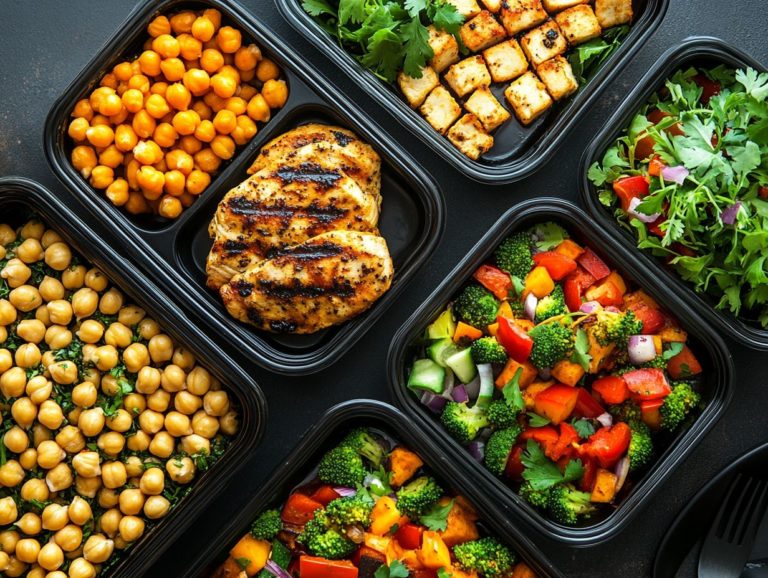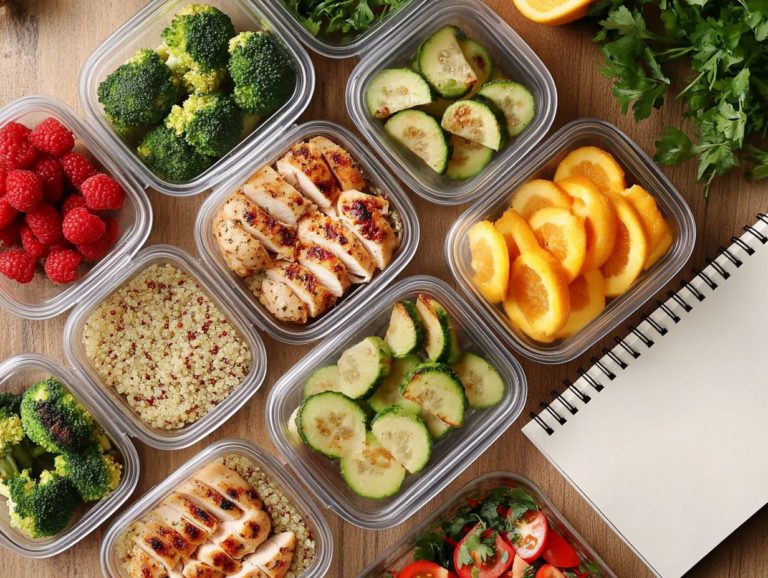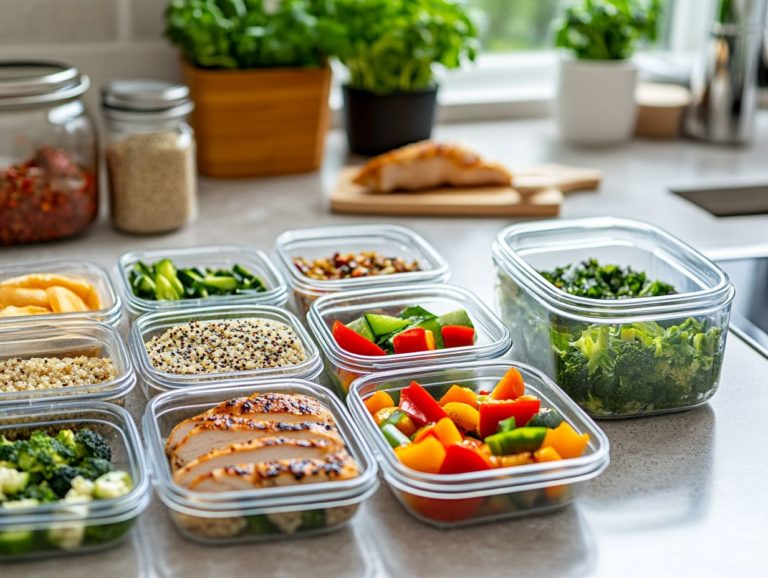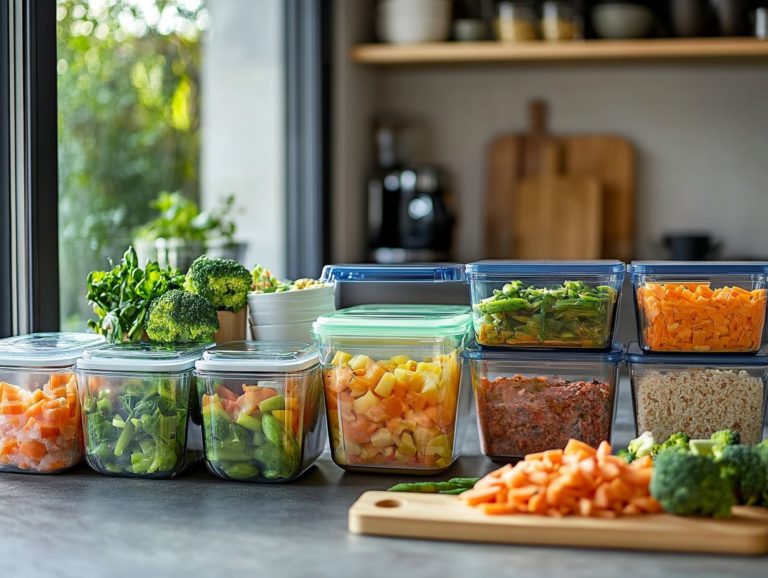How to Make a Meal Plan That Fits Your Lifestyle
Navigating the maze of dietary choices can often feel overwhelming, especially when you’re trying to align meals with your unique lifestyle and nutritional needs.
This guide will help you evaluate your daily routines and dietary requirements, assisting you in creating a balanced meal plan tailored specifically for you.
Whether you’re a busy professional, an athlete, or embracing a vegetarian or vegan lifestyle, you’ll discover practical meal planning strategies, nutritious food options, and tips for successful meal prep.
Prepare to transform your eating habits into something that genuinely fits your life!
Contents
- Key Takeaways:
- Understanding Your Lifestyle and Nutritional Needs
- Creating a Balanced Meal Plan
- Meal Planning for Different Lifestyles
- Tips for Successful Meal Planning
- How to Stick to Your Meal Plan
- Frequently Asked Questions
- What is a meal plan and why is it important?
- How can I determine my specific dietary needs?
- What are some tips for creating a meal plan that fits my lifestyle?
- How can I save time when making a meal plan?
- What should I do if my lifestyle changes and my meal plan no longer fits?
- Can I still enjoy eating out or indulging in treats?
Key Takeaways:

- Understand your lifestyle and nutritional needs.
- Create a balanced meal plan with nutritious foods.
- Tailor your meal plan to fit your lifestyle.
Understanding Your Lifestyle and Nutritional Needs
Understanding your lifestyle and nutritional needs is essential for effective meal planning. This knowledge forms the backbone of creating customized meal plans that truly cater to your specific food preferences and dietary requirements. For those struggling with this process, exploring tips on how to overcome meal planning challenges can be incredibly helpful.
By thoroughly reviewing your schedule, you can pinpoint the optimal time slots for meal preparation, grocery shopping, and cooking. This strategic approach can help you understand how to meal plan for a family of four, ensuring that your meal plan seamlessly integrates with your daily routine and supports your nutritional goals.
Evaluating Your Daily Routine and Dietary Requirements
Evaluating your daily routine and dietary requirements is the crucial first step to crafting an effective meal plan that aligns with your lifestyle and nutrition goals. By considering factors like your energy levels for cooking and the time you have available throughout the day, you can refer to how to plan meals around your schedule to design a plan that feels effortless and enjoyable!
Understanding when to allocate time for meal prep can significantly reduce the stress of last-minute cooking and streamline your weekly food preparation. Incorporating variety into your meal offerings keeps your diet both interesting and enjoyable.
To boost your efficiency, consider implementing meal planning strategies such as:
- Batch cooking
- Utilizing slow cookers
- Preparing freezer-friendly options
These practices will ensure that healthy choices are always at your fingertips while keeping your schedule manageable.
Creating a Balanced Meal Plan
Crafting a balanced meal plan is crucial for reaching your nutritional goals while ensuring your meals are both satisfying and wholesome.
By integrating a diverse array of nutritious foods and utilizing effective portion control strategies, you can design a meal plan that supports your health and aligns with your grocery budget and personal food preferences. To enhance your success, consider tips on how to stay committed to your meal plan.
Incorporating Nutritious Foods and Portion Control

Incorporating nutritious foods and practicing portion control managing how much food you eat at one time are essential elements of an effective meal plan that delivers healthy meals without sacrificing flavor.
To achieve this, focus on selecting a diverse array of whole foods that are brimming with vitamins, minerals, and healthy fats while keeping an eye on serving sizes. Integrating a rainbow of colorful vegetables, lean proteins like grilled chicken or beans, and whole grains such as quinoa or brown rice can significantly elevate the nutritional value of your meals. Consider using smaller plates or bowls to help manage portion sizes with ease.
A sample meal plan might include:
- Breakfast: Overnight oats topped with fresh fruit and nuts,
- Lunch: A vibrant salad featuring chickpeas,
- Dinner: Baked salmon paired with steamed broccoli and sweet potatoes.
These choices not only tantalize your taste buds but also contribute to your overall well-being.
Meal Planning for Different Lifestyles
Meal planning for diverse lifestyles demands an appreciation of individual needs and preferences. This insight gives you the power to create customized meal prep ideas, and learning how to plan meals for a busy week can help align them seamlessly with different cooking styles and dietary requirements.
Meal Planning for Busy Professionals
For busy professionals like you, effective meal planning is vital for managing your time and maintaining a healthy diet, even when life gets hectic. By using the best meal planning strategies for beginners, you can streamline your culinary routines and make nutritious eating second nature, without the stress.
One effective approach is batch cooking. Prepare larger portions on weekends that you can easily access during the weekdays. This method saves you precious time and helps you resist unhealthy fast food options.
Incorporating quick meal recipes that require minimal prep can make a world of difference in your week. Using grocery delivery services can also elevate your meal planning. You can curate shopping lists filled with wholesome ingredients while keeping convenience front and center.
Meal Planning for Athletes
Meal planning for athletes focuses on customizing your meal selections to meet your specific nutrition goals and energy needs for optimal performance.
This task requires understanding the unique challenges your body faces during intense physical activity. For example, if you re engaged in endurance sports, you need to ensure you have enough carbohydrates to maintain energy levels. Conversely, if you re a strength athlete, a higher protein focus is crucial for muscle recovery and growth.
To cater to these varying needs, consider meal ideas like:
- Quinoa salads brimming with vibrant vegetables and lean protein.
- Smoothies packed with fruits and a handful of spinach.
These options can be both nourishing and delicious. By integrating healthy foods and striking the right balance of macros, your thoughtfully designed meal plan can significantly boost your performance and expedite recovery.
Meal Planning for Vegetarians/Vegans

For those following a vegetarian or vegan lifestyle, meal planning becomes an art of crafting plant-based dishes that deliver essential nutrients and resonate with personal dietary choices.
To excel in this endeavor, embrace a wide array of ingredients, including legumes, whole grains, fruits, and vegetables. This diversity elevates your dining experience with exciting flavors and ensures a well-rounded intake of proteins, vitamins, and minerals. Using seasonal produce can significantly enhance both the nutritional value and taste of your meals.
Adopt meal planning strategies like batch cooking or developing versatile recipes. These approaches streamline your week, save time, and promote healthy eating without deprivation.
Tips for Successful Meal Planning
Successful meal planning revolves around strategic organization, efficient meal preparation, and a well-crafted grocery list. This approach minimizes food waste and aligns perfectly with your nutritional goals.
Meal Prep and Storage Strategies
Effective meal prep and storage strategies can dramatically cut down your cooking time and minimize food waste, paving the way for more efficient meal planning.
By embracing techniques like batch cooking and careful portioning, you can streamline your culinary process and boost energy efficiency in your kitchen. Preparing larger quantities of food at once saves time during hectic weekdays and ensures that your ingredients are used wisely, reducing spoilage risk.
Understanding how to store your meals properly whether in airtight containers or freezer-safe bags extends their shelf life while preserving nutritional value.
This intentional approach creates a more organized cooking routine and encourages sustainable habits. You can savor delicious, homemade meals all week long!
Don’t let your busy schedule derail your healthy eating act now! Start planning your meals today for a healthier tomorrow!
How to Stick to Your Meal Plan
Sticking to your meal plan can feel tough. To enhance your approach, consider meal planning for success by establishing a routine and allowing some flexibility to stay on track.
Incorporate accountability methods. Share your goals with a friend or join a support group to boost motivation.
Embrace occasional deviations from your plan. This lets you explore new foods and adapt to your changing tastes.
This balance between structure and flexibility helps you maintain progress. Enjoy the journey of healthy eating!
Frequently Asked Questions

What is a meal plan and why is it important?
A meal plan is a schedule of meals and snacks for a specific time. It helps you stay organized, saves time, and supports healthier choices.
How can I determine my specific dietary needs?
Consider your personal preferences and any food allergies or intolerances. Also, think about your health conditions and daily calorie needs.
What are some tips for creating a meal plan that fits my lifestyle?
– Start by setting realistic goals and consider your schedule and budget. – Choose recipes that you enjoy and are easy to prepare. – Plan for variety to avoid boredom and include all food groups. – Make a grocery list based on your meal plan to avoid unnecessary purchases. – For more guidance, check out this how to make a meal plan for the week. – Allow for flexibility and adjust as needed.
How can I save time when making a meal plan?
Prep ingredients in advance to save time. You can also use leftovers in future meals and choose recipes that require minimal cooking.
What should I do if my lifestyle changes and my meal plan no longer fits?
If your lifestyle changes, adjust your meal plan accordingly. This may involve changing meal types or the frequency of meal planning, and learning how to optimize your meal plan for health.
Can I still enjoy eating out or indulging in treats?
Yes, you can enjoy dining out and treats while following a meal plan. Practice moderation and make healthier choices when eating out.






